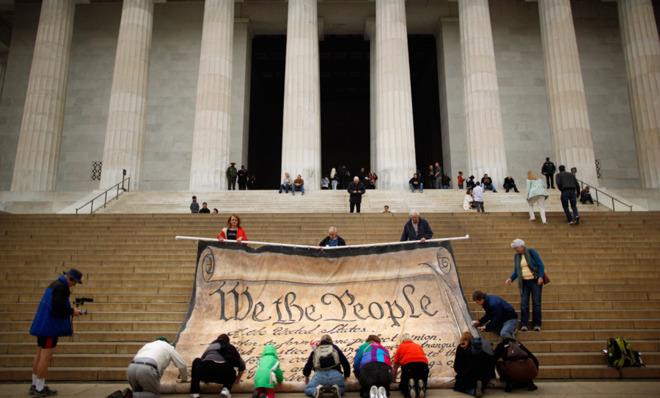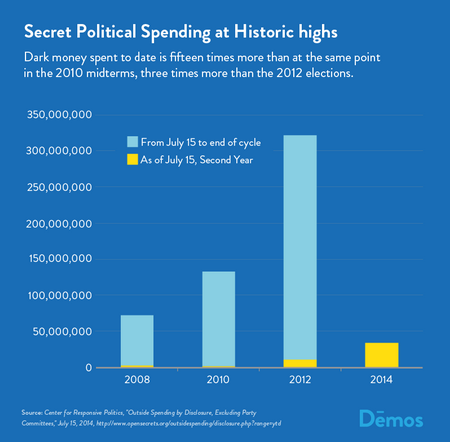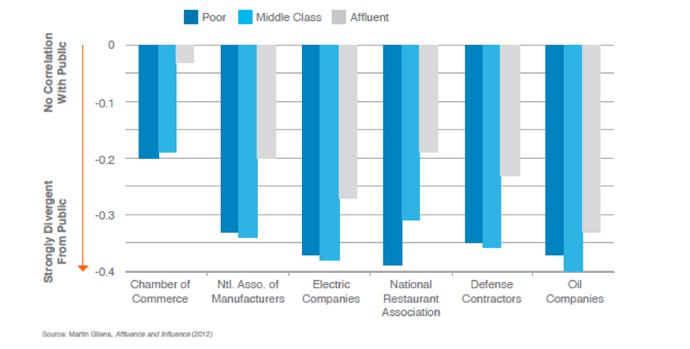The SEC should shine a light on dark political donations from corporations
Transparency now!

A free daily email with the biggest news stories of the day – and the best features from TheWeek.com
You are now subscribed
Your newsletter sign-up was successful
Nate Silver has already dubbed the 2014 election as "the least important in years." But this year's midterms are still breaking records for at least one thing: Secret political spending.
A historically unprecedented amount of dark money has already been spent to influence the outcome of the elections. As of July 15, more than $34 million in dark money had been spent on the 2014 election cycle. That is more than 15 times the $2 million–plus in dark money spent at this point in the 2010 midterms, and three times the $11 million in dark money spent at this point in the 2012 elections.
Dark money means political spending where the identity of the underlying source of the funds is not public. The Supreme Court's Citizens United decision in 2010 allowed new political spending from corporations, and subsequent decisions removed limits on so-called independent spending. Now, sophisticated political players who want to exercise power without accountability are channeling their political spending through 501(c)(4) "social welfare" groups that aren't required to disclose their funders.
The Week
Escape your echo chamber. Get the facts behind the news, plus analysis from multiple perspectives.

Sign up for The Week's Free Newsletters
From our morning news briefing to a weekly Good News Newsletter, get the best of The Week delivered directly to your inbox.
From our morning news briefing to a weekly Good News Newsletter, get the best of The Week delivered directly to your inbox.
The price we pay for this failure of transparency is a loss of information for voters, and a lack of accountability for both the spenders and beneficiaries of dark money.
Since most outside spending comes in a flurry in the last month of the election, we can expect these numbers to keep on rising. In 2012, 60 percent of dark money was spent on or after Oct. 1. If these trends hold, dark money totals this year will certainly break the 2010 midterm record and may even surpass the over $300 million in secret spending in the 2012 elections.
On Wednesday, the U.S. Senate Rules and Administration Committee held a hearing to promote transparency in election spending. They're considering legislation that would require all outside political spending groups to disclose their significant donors (the DISCLOSE Act), and a bill that would require candidates, parties, and PACs that are already covered by federal disclosure laws to disclose their major donors more rapidly and electronically (the Real Time Transparency Act). As Sen. Angus King (I-Maine) explained in the hearing, just knowing that "Americans for Greener Grass" paid for an ad isn't really disclosure, because it doesn't tell you anything about the agenda of whoever is providing the financial support for the group.

The Supreme Court was wrong when it assumed that the new corporate political spending the justices allowed in Citizens United would be disclosed to the public and to a corporate donor's shareholders, since there are no legal requirements that corporations disclose all of their political spending.
A free daily email with the biggest news stories of the day – and the best features from TheWeek.com
Congress attempted to respond to the Citizens United decision and create a comprehensive disclosure system in 2010, when the DISCLOSE Act was approved by majorities in both chambers of Congress, but then failed by one vote to overcome a party-line filibuster in the Senate. Some critics argued at the time that the bill unfairly regulated corporations while requiring less disclosure from unions. As we explain in our new Demos paper, this is far from the truth. Corporations and unions face very different rules and requirements for their political spending. Labor unions must publicly disclose all of their political spending to the Department of Labor. But in the wake of Citizens United, there are many avenues through which corporations can spend money in politics while hiding their financial support for particular candidates or causes.
Both unions and corporations must disclose to the FEC any direct political spending made to finance independent expenditures and electioneering communications, but the similarities end there. Unions are required to report the money they spend not just in federal elections, but also for state and local office. Corporations are not subject to these same requirements, except in a few states that have strengthened their disclosure laws. Unions are required to report get-out-the-vote campaigns, voter education campaigns, fundraising, and any politically related litigation expenses. Corporations are not. Unions are required to disclose all donations to 501(c)(4) groups on their Schedule 17 form. Corporations are not.
Why does this matter? Corporate donors spend big: The U.S. Chamber of Commerce spent $69,506,784 on elections in 2010 and 2012, without identifying the source of those funds, and was the biggest outside spender in the 2010 elections. And according to the research of Martin Gilens, the Chamber of Commerce and other corporate donors lobby against the expressed preferences of most Americans.

In contrast, unions advocate in favor of the expressed preferences of most Americans. Gilens notes that "unions would appear to be among the most promising interest group bases for strengthening the policy influence of America's poor and middle class." Corporate spending and union spending aren't just different in terms of how they are regulated, they also represent the interests of different groups. It's time to put unions on the same footing as big corporations.
Citizens United changed the game, but the rules have not kept up. Just as unions report their spending to the Department of Labor (which posts the reports online), the Securities and Exchange Commission has the authority and responsibility to require that corporations report their direct and indirect political spending to their shareholders, who have a right to know if and how their investments are being used for political purposes. A group of legal scholars has petitioned the SEC to mandate corporate disclosures in the interest of shareholder accountability. In response to the huge support it has received, the SEC added consideration of the rule to its agenda but has since dropped it in the face political pressure.
Congress and the SEC now have another chance to act to get this simple principle right. If not, undisclosed corporate spending will continue to poison our democracy.
-
 Kurt Olsen: Trump’s ‘Stop the Steal’ lawyer playing a major White House role
Kurt Olsen: Trump’s ‘Stop the Steal’ lawyer playing a major White House roleIn the Spotlight Olsen reportedly has access to significant U.S. intelligence
-
 Rubio boosts Orbán ahead of Hungary election
Rubio boosts Orbán ahead of Hungary electionSpeed Read Far-right nationalist Prime Minister Viktor Orbán is facing a tough re-election fight after many years in power
-
 Hyatt chair joins growing list of Epstein files losers
Hyatt chair joins growing list of Epstein files losersSpeed Read Thomas Pritzker stepped down as executive chair of the Hyatt Hotels Corporation over his ties with Jeffrey Epstein and Ghislaine Maxwell
-
 The billionaires’ wealth tax: a catastrophe for California?
The billionaires’ wealth tax: a catastrophe for California?Talking Point Peter Thiel and Larry Page preparing to change state residency
-
 Bari Weiss’ ‘60 Minutes’ scandal is about more than one report
Bari Weiss’ ‘60 Minutes’ scandal is about more than one reportIN THE SPOTLIGHT By blocking an approved segment on a controversial prison holding US deportees in El Salvador, the editor-in-chief of CBS News has become the main story
-
 Has Zohran Mamdani shown the Democrats how to win again?
Has Zohran Mamdani shown the Democrats how to win again?Today’s Big Question New York City mayoral election touted as victory for left-wing populists but moderate centrist wins elsewhere present more complex path for Democratic Party
-
 Millions turn out for anti-Trump ‘No Kings’ rallies
Millions turn out for anti-Trump ‘No Kings’ ralliesSpeed Read An estimated 7 million people participated, 2 million more than at the first ‘No Kings’ protest in June
-
 Ghislaine Maxwell: angling for a Trump pardon
Ghislaine Maxwell: angling for a Trump pardonTalking Point Convicted sex trafficker's testimony could shed new light on president's links to Jeffrey Epstein
-
 The last words and final moments of 40 presidents
The last words and final moments of 40 presidentsThe Explainer Some are eloquent quotes worthy of the holders of the highest office in the nation, and others... aren't
-
 The JFK files: the truth at last?
The JFK files: the truth at last?In The Spotlight More than 64,000 previously classified documents relating the 1963 assassination of John F. Kennedy have been released by the Trump administration
-
 'Seriously, not literally': how should the world take Donald Trump?
'Seriously, not literally': how should the world take Donald Trump?Today's big question White House rhetoric and reality look likely to become increasingly blurred